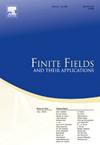Few-weight linear codes over Fp from t-to-one mappings
IF 1.2
3区 数学
Q1 MATHEMATICS
引用次数: 0
Abstract
For any prime number p, we provide two classes of linear codes with few weights over a p-ary alphabet. These codes are based on a well-known generic construction (the defining-set method), stemming on a class of monomials and a class of trinomials over finite fields. The considered monomials are Dembowski-Ostrom monomials , for a suitable choice of the exponent α, so that, when and , these monomials are planar. We study the properties of such monomials in detail for each integer and any prime number p. In particular, we show that they are t-to-one, where the parameter t depends on the field and it takes the values or . Moreover, we give a simple proof of the fact that the functions are δ-uniform with . This result describes the differential behavior of these monomials for any p and n. For the second class of functions, we consider an affine equivalent trinomial to , namely, for . We prove that these trinomials satisfy certain regularity properties, which are useful for the specification of linear codes with three or four weights that are different than the monomial construction. These families of codes contain projective codes and optimal codes (with respect to the Griesmer bound). Remarkably, they contain infinite families of self-orthogonal and minimal p-ary linear codes for every prime number p. Our findings highlight the utility of studying affine equivalent functions, which is often overlooked in this context.
从 t 到一映射的 Fp 上的少权线性编码
对于任意素数 p,我们提供了两类 pary 字母表上权重较小的线性编码。这些编码基于一种著名的通用构造(定义集方法),源于有限域上的一类单项式和一类三项式。所考虑的单项式是登鲍斯基-奥斯特罗姆单项式 xpα+1,对于指数 α 的适当选择,当 p>2 和 n≢0(mod4)时,这些单项式是平面的。我们详细研究了每个整数 n>1 和任意素数 p 的此类单项式的性质。我们特别证明了它们是 t 对一的,其中参数 t 取决于场 Fpn,取值为 1、2 或 p+1。此外,我们还给出了函数δ∈{1,4,p}的δ均匀性的简单证明。对于第二类函数,我们考虑 xpα+1 的仿射等价三项式,即对于 λ∈Fpn⁎ 的 xpα+1+λxpα+λpαx 。我们证明了这些三项式满足某些正则特性,这对于规范与单项式构造不同的三重或四重线性编码非常有用。这些代码族包含投影代码和最优代码(关于格里斯梅尔约束)。值得注意的是,对于每个素数 p,它们都包含自正交和最小 pary 线性编码的无穷族。我们的发现突出了研究仿射等价函数的实用性,而这一点在这方面往往被忽视。
本文章由计算机程序翻译,如有差异,请以英文原文为准。
求助全文
约1分钟内获得全文
求助全文
来源期刊
CiteScore
2.00
自引率
20.00%
发文量
133
审稿时长
6-12 weeks
期刊介绍:
Finite Fields and Their Applications is a peer-reviewed technical journal publishing papers in finite field theory as well as in applications of finite fields. As a result of applications in a wide variety of areas, finite fields are increasingly important in several areas of mathematics, including linear and abstract algebra, number theory and algebraic geometry, as well as in computer science, statistics, information theory, and engineering.
For cohesion, and because so many applications rely on various theoretical properties of finite fields, it is essential that there be a core of high-quality papers on theoretical aspects. In addition, since much of the vitality of the area comes from computational problems, the journal publishes papers on computational aspects of finite fields as well as on algorithms and complexity of finite field-related methods.
The journal also publishes papers in various applications including, but not limited to, algebraic coding theory, cryptology, combinatorial design theory, pseudorandom number generation, and linear recurring sequences. There are other areas of application to be included, but the important point is that finite fields play a nontrivial role in the theory, application, or algorithm.

 求助内容:
求助内容: 应助结果提醒方式:
应助结果提醒方式:


